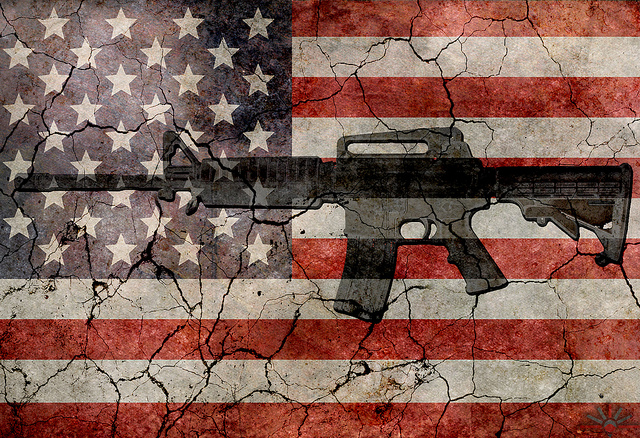The fatuous debate over gun control that follows every mass shooting in the U.S. is predictable and unproductive.
We’ve all got caught up in the bludgeoning social media back-and-forth that serves only to frustrate and further divide the two sides. I propose a different approach.
Rather, than going back down the rabbit hole, I suggest we look for common ground and solid footing.
Roughly 90% of Americans are in favor of universal background checks for all gun purchases—online and at gun shows—using a centralized database across all 50 states. There are few issues in modern American politics that enjoy such unanimous support, so why hasn’t Congress passed a law requiring universal federal background checks? For a number of different reasons, two of which I’d like to mention here.
First, advocacy groups like the NRA have successfully convinced their constituency that such measures are a slippery slope. If we start down this road, they argue, the government will eventually come for all of our guns. Second, the far left confirms these fears. Liberals too often argue that all guns should be banned. This is the vicious cycle that pushes both sides back to their entrenched camps where we sit fuming while nothing gets done.
Gun control is not a matter of opinion. It is, first and foremost, a matter of law. We live in a nation of laws and the second amendment guarantees “the right of the people to keep and bear Arms.” So when you start talking about banning the sale of all weapons, not only do you play into the misdirection of the NRA, you start down a dead end path.
Radical gun control advocates do not argue for gun control, but for abolition. They argue that the objective clause of the second amendment—“the right of the people to keep and bear Arms”—is limited by the prefatory clause—“a well regulated Militia, being necessary to the security of a free State.” This is a losing argument. The Supreme Court has ruled that the right to keep and bear arms is not limited to the purposes of forming a militia. It is a right extended to the individual for purposes of self-defense.
When confronted by the individual’s right to keep and bear arms, many reply, “The framers of the constitution did not imagine a weapon like the AR-15 used by the Orlando shooter.” Though true, it is another losing argument. The Court has ruled that the second amendment protects the right of law-abiding citizens to posses weapons commonly used for purposes of self-defense. It is not common to what was in use in the 18th century. “Common use” refers to any weapon currently utilized by the general public for lawful purposes. Just as free speech is extended to the internet—though the framers could not have fathomed such a technology—the second amendment protects the right of individuals to possess modern weaponry commonly utilized for purposes of self-defense.
However, the second amendment is not an unlimited right. This is where things get interesting. The law protects weapons that are in common use at the time, but simultaneously grants Congress the power to pass laws prohibiting the sale of firearms to felons, mentally ill individuals, and people with known terrorist connections; as well as impose penalties for carrying firearms into schools and government buildings, or laws regulating the sale of “dangerous and unusual weapons.”
The second amendment is not an all encompassing umbrella that protects everything from the formation of a militia to recreational shooting. It protects the right of the individual to keep and bear weapons commonly utilized for the purposes of lawful self-defense.
So, the real question is not whether the founding fathers conceived of a weapon like the AR-15, but whether modern citizens commonly utilize AR-15s for purposes of self-defense. Handguns? Yes. Shotguns? Yes. AR-15s? I’m not so sure.
“I spent a career carrying typically either an M16 or an M4 Carbine. An M4 Carbine fires a .223 caliber round which is 5.56 mm at about 3,000 feet per second,” says General Stanley McChrystal, who led the war in Afghanistan.
“When it hits a human body, the effects are devastating. It’s designed for that. That’s what our soldiers ought to carry,” he said. “I personally don’t think there’s any need for that kind of weaponry on the streets and particularly around the schools in America… I understand everyone’s desire to have whatever they want—but we’ve got to protect our children, we’ve got to protect our police, we’ve got to protect our population,” he concluded.
The second amendment does not protect our desire to have whatever we want. It defends our right to protect ourselves.
For this reason, the D.C. handgun ban was deemed unconstitutional. Among lawful citizens, handguns are a ubiquitous choice for self defense. Assault weapons are another matter. The weapons necessary to provide for an adequate self-defense are determined by what weapons are commonly used for the purposes of self-defense. When confronted by a home invader or carjacker, I doubt many people reach for their semi-automatic rifle. In both instances, I suspect, a shotgun or handgun is the more likely candidate because both are more effective instruments of self-defense.
AR-15s are not intended for self-defense. They are an offensive weapon, which is why they are called assault weapons. So while I do not question the right of any law abiding citizen to own a handgun or shotgun, I do question the necessity and therefore the right to own an assault weapon. I am not alone in this opinion. Nearly 60% of Americans favor an assault weapons ban.
Early Sunday morning, hundreds of Americans were attacked. As my friend Carlston put it,
“They weren’t just a group of people at a bar partying. They were a group of people celebrating their hard-earned liberties in what was supposed to be a safe place. A place, like thousands of others across America, where members of LBGT community gather. They were targeted for being who they are, for living free.”
The plague of mass murders and the growing danger of domestic terrorism both threaten that freedom. Something has to be done.
In his final year, President Obama will not be able to get a gun control bill through Congress. The 45th President of the United States and the 115th Congress will determine our response to the epidemic of mass shootings and the looming threat of homegrown terrorism.
The election in November will be a referendum on gun control, among many other issues. Hillary Clinton is a lifelong advocate of stricter gun control measures. It is one of her core campaign issues. In fact, in 1994 Bill Clinton signed into law the Federal Assault Weapons Ban—which, in the face of several constitutional challenges, was upheld by the courts. For her part, Secretary Clinton has put forward a plan that will strengthen background checks, close loopholes, and keep guns out of the hands of terrorists, domestic abusers, violent criminals, and the severely mentally ill.
Donald Trump, on the other hand, has stated on several occasions that he wants to eliminate gun free zones, including at our schools.
There is a lot at stake. The contrast between the two candidates could not be starker. The issue could not be more pressing.
Author: Benjamin Riggs
Image: Flickr
Editors: Emily Bartran; Nicole Cameron









Read 0 comments and reply